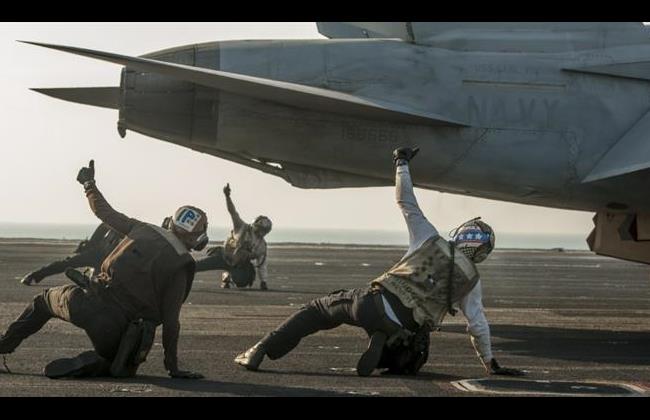U.S. Senate committee backs new war powers
The Daily Star/Dec. 12, 2014
WASHINGTON: The Senate Foreign Relations Committee voted Thursday to authorize President Barack Obama’s war against ISIS – the first vote in Congress to explicitly grant him war powers in the U.S. battle against the militant extremists.
The vote was 10-8, with most Democrats in favor and Republicans opposed.
The committee chairman, Sen. Robert Menendez said he would seek a full Senate vote on the measure before the current Congress ends, but it’s more likely that the authorization will be delayed until the next, Republican-led Congress, which starts Jan. 1.
In the U.S. battle against ISIS, Obama has been relying on congressional authorizations that former President George W. Bush used to justify military action after 9/11.
Critics say the White House’s use of post-9/11 congressional authorizations is a legal stretch, at best.
Obama has insisted that he had the legal authority to send about 3,000 U.S. troops to train and assist Iraqi security forces, and launch 1,100 airstrikes against targets in Iraq and Syria since September. More recently, the president has said that he wants a new authorization for use of military force.
Secretary of State John Kerry said Tuesday whatever new authorization Congress passes should not limit U.S. military action to Iraq and Syria or prevent the president from deploying ground troops if he later deems them necessary.
Menendez’ resolution, which was passed, would authorize the president to use military force against ISIS and associated persons or forces – individuals fighting for or on behalf of ISIS. It would limit the activities of U.S. forces so that there would be no large-scale ground combat operations. Menendez has said that if the president feels he needs that, then he should ask Congress for authorization to do that.
The authorization would be limited to three years and would require the administration to report on the fight against ISIS every 60 days. He said a three-year time limit would allow Obama and the next president time to assess the situation and make decisions about whether and how to continue military action against ISIS.
In Syria, ISIS militants continued their seemingly stalled offensives against mainly Kurdish fighters in the towns of Ain al-Arab and Ras al-Ain, both on the border with Turkey.
The Syrian Observatory for Human Rights, a Britain-based, anti-regime monitoring group, said Kurdish YPG fighters killed at least three ISIS militants in one skirmish, near Ain al-Arab.
In Aleppo province, Syrian regime warplanes launched four strikes against ISIS positions at the Sheikh Jarrah airport, held by the militant group. They also launched two strikes against ISIS fighters around the town of Tabqa in Raqqa province, but there was no information about casualties, the Observatory said.
In Deir al-Zor, ISIS fighters seized territory from regime forces in the Huwayjet al-Sakr region, the Observatory said, as skirmishes continued around the perimeter of the city’s military airport, where regime troops are besieged.
The Observatory’s director, Rami Abdel-Rahman, told Al-Hurra television that although a recent offensive by ISIS to storm the airport had failed, the regime was exaggerating its achievements against the jihadis.
“The regime has stopped two attacks by ISIS in recent days, but the battles are continuing, in contrast to what the regime’s media is saying, trying to raise the morale,” he said.
“The regime’s army and the National Defense [paramilitary force] are taking casualties on a daily basis” at the airport and in several other areas in and around the city, he added.
The Syrian News Desk, an independent internet news outlet, said four hours of clashes between regime forces and ISIS militants raged in rural Homs province near the Shaar gas field, which both sides have been contesting in recent months.
Both sides suffered casualties in the fighting, which erupted after the regime sent reinforcements to the area.























